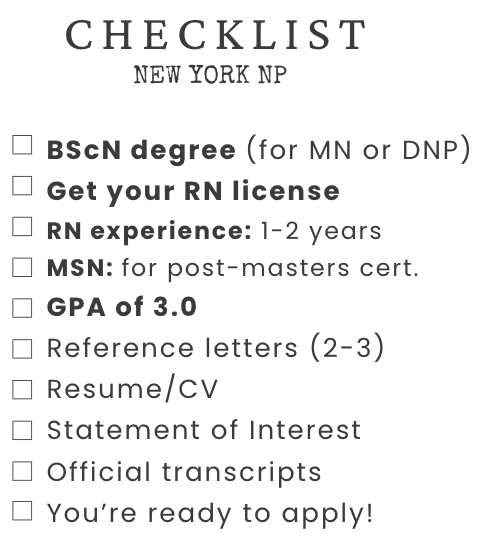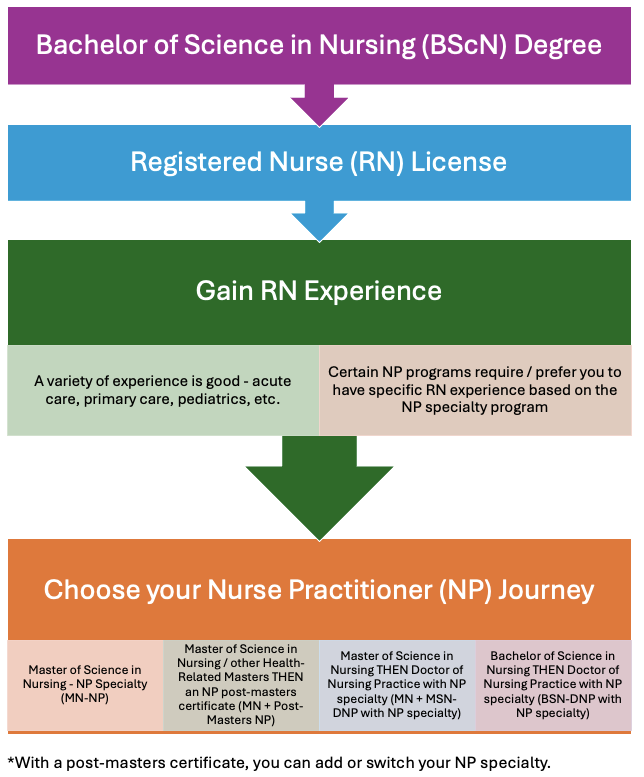Nurse Practitioner/APRN Programs in New York
The path to becoming a nurse practitioner will be unique to you. For those of you thinking of pursing a career as an NP, I hope to provide some guidance. If you want a general overview on how to become an NP in the U.S., I suggest you read this post. If you plan on pursuing an NP career in New York, then read on!
First, let’s define some terms:
BSN: bachelor's of nursing science (undergraduate degree)
MSN: masters of nursing science (masters graduate degree)
MN-NP: combined maters + nurse practitioner degree (masters graduate degree)
DNP: doctor of nursing science (some schools offer with an NP specialty) (doctoral graduate degree)
Post-masters certification: an additional certification (like an NP speciality) someone gets after completing a masters of nursing degree
Recap: How to Become a Nurse Practitioner (NP) in the US
If you’re thinking of becoming an NP, I highly recommend this read to get you prepared.
You can also join the NP reasoning community to get your NP learning kick-started - LEARN MORE.
What Nurse Practitioner Programs are offered in New York?
There are 4 streams:
Master of Science in Nursing with an NP specialty (MN-NP)
Post-masters NP
Bachelor of Science in Nursing to Doctor of Nursing Practice (BSN-DNP) with an NP specialty
Masters of Science in Nursing to DNP (MSN-DNP) with an NP specialty
Let’s break these down:
MN-NP programs: these are for students who do not have a master’s degree in nursing. Courses are a blend of masters & NP courses, to prepare you to become an NP.
Programs: family, adult-gerontology primary care, adult-gerontology acute care, psych/mental health, pediatric primary care, pediatric acute care, neonatal, women’s health
Post-masters programs: you require a master’s degree in nursing to apply for a post-masters program. Programs focus on core NP courses to prepare you to become an NP.
Programs: family, adult-gerontology primary care, adult-gerontology acute care, pediatric, psych/mental health, neonatal
BSN-DNP with an NP specialty: This is an advanced, doctoral-level nursing program for Registered Nurses (RNs) with a Bachelor of Science in Nursing (BSN) who want to become a specialized Nurse Practitioner (NP). These programs are typically longer e.g. 3-4 years.
MSN-DNP with an NP specialty: This is an advanced, doctoral-level nursing program for Registered Nurses (RNs) with a Master of Science in Nursing (MSN) who want to become a specialized Nurse Practitioner (NP). These programs are typically longer e.g. 3-4 years.
Programs: family, adult-gerontology primary care, adult-gerontology acute care, neonatal, pediatric, psych/mental health, neonatal, women’s health
Nurse Practitioner (NP) Specialties in New York:
Want to kick-start your NP journey? NP Reasoning curates the top guideline updates, clinical approaches & diagnostic pearls to help you make confident decisions with your patients.
Sign me up!
Nurse Practitioner (NP) Schools in New York
There are LOTS - here is a quick snapshot of all the programs offered by University:
If you want to check out a document I compiled with up to date information on each program + links to each program embedded click the button below:
Online Nurse Practitioner (NP) Programs in New York
Several universities offers online NP programs which allows for flexible learning. Several highlight the need for a few on-campus “intensives.” Intensives are hands-on workshops that bridge the gap between theoretical knowledge and practical application. These immersions are held at the university's physical location, are guided by expert faculty, and focus on refining advanced clinical skills in a supportive, collaborative environment, reinforcing the university's commitment to career-ready graduates.
Chamberlain University: MN-NP (family, adult gerontology primary care, adult gerontology acute care, psych/mental health)
Walden University: MN-FNP
Georgetown: MN-FNP
Grand Canyon University: MN-NP (family, psych/mental health); post-masters NP (family, psych/mental health)
University of Rochester School of Nursing: MN-NP (family, adult gerontology acute care, adult gerontology primary care, pediatric primary care, pediatric acute care, pediatric neonatal, psych/mental health); post-masters NP (adult gerontology acute care, pediatric acute care, neonatal)
D’Youville University: MN-NP (family, psych/mental health), MSN-DNP (family, psych/mental health), post-masters NP (psych/mental health)
St John Fisher University: MN-NP (family, psych/mental health, adult gerontology acute care, adult gerontology primary care)
SUNY Polytechnic Institute Online: MN-NP/post-masters NP (psych/mental health)
Adelphi University: MN-NP/post-masters NP (adult gerontology primary care)
Utica University: MN-NP/MSN-DNP (family)
Nurse Practitioner (NP) Program Pre-Requisites in New York
Most schools in New York require the following pre-requisites:
A minimum GPA of 3.0
RN experience: 1-2 years (some do not specify number of hours)
BScN: for masters programs or BSN-DNP programs
MSN: for post-certificate/post-masters programs or MSN-DNP programs
For admission, most NP programs in New York require you to have a BScN degree, RN registration, a GPA of 3.0, and a minimum of 1-2 years RN experience.
Can I work while I’m completing the NP program?
This depends on many factors. One should weigh personal responsibilities, work-life balance, completing the program full-time versus part-time. In general, it’s possible to work while enrolled in the program, but this is up to your comfort level. Personally, I completed a full-time post-masters NP certificate and did not work. The course content, paired with clinical rotations were very intensive, and I was able to immerse myself in the program and get the most out of it. That being said, circumstances differ, and you need to do what works best for you. It’s important to highlight that regardless of the program, it is a steep learning curve and lots of the learning is self directed. If you are seriously considering this next step in your career, our post on how to prepare for NP school will be helpful.
Where can I work as a Nurse Practitioner in New York?
New York NPs work across hospitals, outpatient clinics, specialty offices, community/public health, schools, long-term care, and home health. Since New York is a reduced-practice state, NPs can evaluate, diagnose, and manage patients independently but must have a collaborative agreement with a physician for prescribing certain medications (especially controlled substances).
Key Take home Points:
Do your research on NP programs.
Don’t hesitate to reach out to university admissions offices to ask questions about the program or admission process.
Talk with nurse practitioners who have been through this process already.
Think about what you want out of your career (Do you want a serious challenge with career growth potential?)
The NP program (and career in general!) is intense and will probably be the steepest learning curve of your life. Don’t let this intimidate you – check out our newsletter to kick-start your NP journey.
Join NP Reasoning Masterclass for a practical, curated educational experience for the busy NP.
Disclaimer - The views expressed in this post are my own and do not represent the official position of any organization. This is not a sponsored post.
Related Posts
How Do I Become a Nurse Practitioner in Canada?
How Do I Become a Nurse Practitioner In the U.S.?
How Do I Become a Nurse Practitioner: Getting my License?
How Do I Study for my Nurse Practitioner Certification Exam?
Should I Become a Nurse Practitioner?










